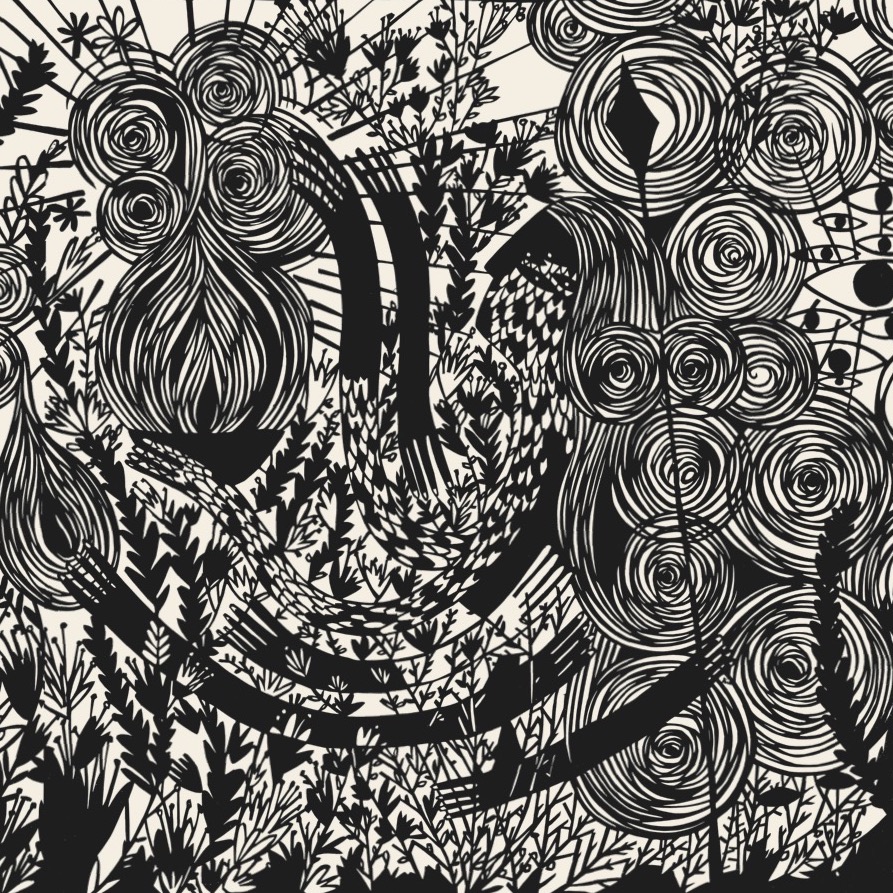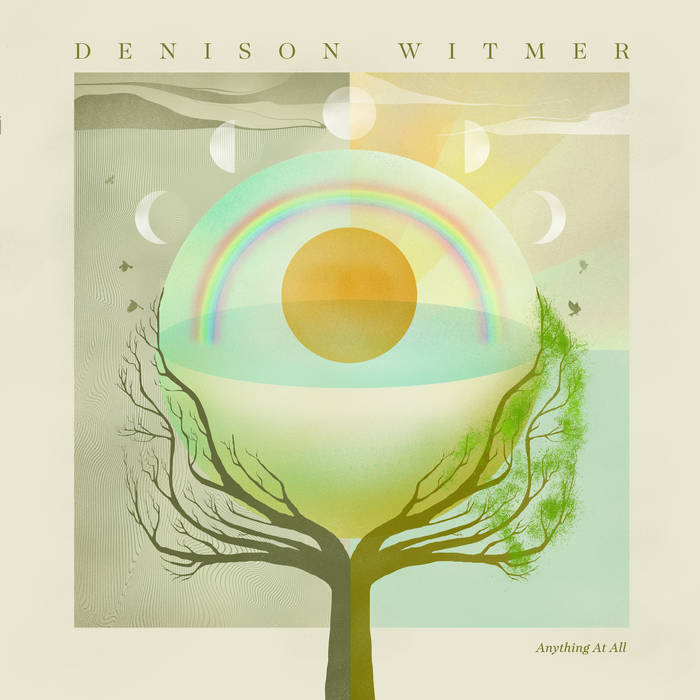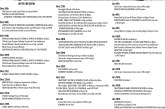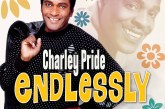Daniel Kimbro – “Carpet in the Kitchen”
It’s hardly a secret that Kimbro is one of the most prolific and prominent artists currently calling East Tennessee home. Aside from his ongoing efforts with Jerry Douglas and The Earls of Leicester, he’s also worked alongside Eric Clapton, John Hiatt, Molly Tuttle, Alison Krauss, Sam Lewis, Larkin Poe, James Taylor … and this list doesn’t even begin to cover all of his credits.
Kimbro’s extensive work as a guest player meant that his solo debut was long overdue, but it is worth the wait. A set of songs that reflect his Appalachian environs, it shows his skills as a songwriter who is far more seasoned than anyone other than his close compatriots might have realized. The album starts out on a high note with “Loyston,” a song with a hook as sharp as a tack and which leaves little doubt as to Kimbro’s ability to make an immediate impression. Aided by Douglas on resonator guitar, Mike Baggetta on electric and loops and Jordan Perlson on drums, Kimbro plays everything else and turns original songs such as “Keep on Livin’,” “Where I Lay You” and “River’s Daughter” into humble yet profound reflections on his Southern roots.
The Drovers Unlimited Orchestra – “The Drovers Unlimited Orchestra, Vol. 3”
The final posthumous effort from Chicago-based musician, composer and producer Mike Kirkpatrick, “Vol. 3” is a highly ambitious effort that combines hints of Celtic and world influences with the exploratory sounds of free-form jazz in ways few might have imagined. Yet it’s a surprisingly cohesive collection of sounds featuring an array of exemplary musicians whose combined craft and creativity make this a most compelling set throughout. The tones and textures vary, from the supple sway of “Girl U Know My Love Is for Real” to the lovely and alluring “Teardrop Falls” to the wildly expressive “Tomorrow Part 1,” “Tomorrow Part 2” and “Moon Fever.”
Kirkpatrick’s musical journey took him from an initial effort with an indie Irish folk-punk band known for its celebratory live revelry to this more exploratory mission. His roots remain intact courtesy of the rousing “Johnny Was a Meter Mechanic” and “Two Slides,” but given the contributions of celebrated fiddler Kevin Burke and highly respected veteran players in saxophonist Dave Liebman, percussionist Billy Hart and trumpeter Eddie Henderson, the symmetry and skill is particularly prominent throughout. Consider this a deep dive into realms flush with ambiance and imagination.
David Berkeley – “A Pail Full Of Fire” / Sons of Town Hall “Of Ghosts and Gods”

Berkeley is a multifaceted artist in the greatest sense. The major musical routes he pursues are decidedly divergent. On the one hand, he’s a sensitive singer-songwriter, as evidenced by his beguiling new solo album. A softly hued set of fragile love songs, it’s marked by a series of captivating melodies and a subdued sensibility. That sense of solace remains quietly consistent throughout, as shared in songs such as “Wild Code,” “Omaha,” “The Right and Wrong” and everything that falls in between.
On the other hand, as half of the duo known as Sons of Town Hall, he places tongue solidly in cheek in the role of Josiah Chester Jones, fellow traveling companion of George Ulysses Brown, two desperate expatriates attempting to cross the ocean and assimilate to their newly adopted American homeland despite ongoing missteps and unexpected obstacles. Nevertheless, despite the overarching premise, the music remains surprisingly enticing and effortlessly entertaining. Each of the songs on “Of Ghosts and Gods,” which are being released as singles along with EPs of the group’s radio-theater podcast “Madmen Cross the Water,” take a gentle folk-like tact, describing the seafaring journey through an affecting narrative that combines imagination, adventure and historical detail. The two albums make for perfect companion pieces, each genuinely affecting and quietly compelling in their own way.
Cat Ridgeway – “Sprinter”

Ridgeway describes her new album as “indie rock for overthinkers.” At first, that may seem like an unlikely description for any set of songs that is meant to simply entertain. But given the high-profile contributors – members of Ween, Tall Tall Trees and Sylvan Esso, among them – there was clearly some serious intent involved here. The title track refers to the sudden loss of a friend to suicide. “What If?” is serious in itself given that it questions mankind’s existence in the universe, with banjo, trumpet and baritone sax adding to the sense of urgency.
Mostly, though, the album shifts greatly in style and substance, even within the framework of a single song. “Cursive,” for example, shifts from tender trappings to an upward spiral of anthemic proportions. “Epilogue” builds on frantic exuberance, while certain songs – “Go Long (So Long)” and “John’s Lament,” for instance – emphasize the ambiance. In a sense, that versatility is understandable; Ridgeway plays guitar, harmonica, trumpet, trombone, drums, piano, mandolin and bass, and sometimes shares her skill while playing three instruments at once. Call it prog pop if you will, but one thing’s clear: “Sprinter” clearly boasts the dexterity and determination to ensure all the styles stay in sync.
Denison Witmer – “Anything at All”

With a dozen full-lengths and a couple of EPs to his credit, Witmer has established himself as one of the most gifted and prolific singer-songwriters making music today. He has a particular penchant for folk-like melodies, hardly a surprise considering his upbringing in a Mennonite household in Pennsylvania. Produced by longtime pal Sufjan Stevens, “Anything at All” takes a particularly pastoral perspective, putting the focus on reflecting on everyday encounters and simpler circumstances, accompanying ruminations with a sense of sublime circumspect. Songs such as “Older and Free,” “A House With,” “Making Love” and “Confessions” are particularly poignant, and yet, while many of these songs take a somewhat precious approach, there are times when Witmer allows his spirited side to take flight, elevating his efforts through resilience and resolve. After more than 30 years, Witmer sadly still remains unappreciated, at least when compared to the wider recognition he so decidedly deserves. That said, this is an exceptional album, one with a title that points to both promise and possibility.
Heather Maloney – “Exploding Star”

“Exploding Star” is a particularly poignant piece of work. Written in the aftermath of her father’s passing, it nearly didn’t get released. The songs Maloney wrote were so personal and profound that the idea of sharing them seemed somehow inappropriate. Playing her father’s guitar and a keyboard she had owned since childhood, she recorded the album at home, making her dad’s prescience seem all the more palpable. There’s an obvious vulnerability evident throughout, as is a sense of quiet contemplation. “To a Special No One,” “Familiar Face” and “Light You Leave Behind” share a solitary stance, weaving delicate designs that leave little doubt as to the sense of loss and despair that inform them.
Maloney takes a simple strum and a breathless vocal and turns them into profound statements about what’s left after the loss of a loved one. The embers of memories that linger on create powerful reminders of the fact that, while life goes forward, certain traces remain behind. Indeed, Maloney seems to take comfort in conveying a comforting caress, as a song such as the title track demonstrates so decidedly. On the other hand, the shimmering strains of “Angelfish,” “Things I Thought I Needed” and an unexpected cover of Duran Duran’s “Ordinary World” bring Joni Mitchell to mind in the blend of solace and simplicity. The beauty is nothing less than beguiling and entrancing.
The Scarlet Goodbye – “El Camino Adios”

The Scarlet Goodbye boasts musicians with some storied credentials. One of its prime movers, Daniel Murphy, was a key member of Soul Asylum and, later, the supergroup known as Golden Smog. His partner in this project is Jeff Arundel, a Minnesota-based singer-songwriter and producer. Their new album centers on a mythical town, presumably in the high desert of the Southwest, but it also centers on universal emotions and the challenges of finding one’s way in the world. The moving title track and the closing offering “End of Summer” sum up those feelings.
The Scarlet Goodbye emulates the taut and determined delivery Midwestern rock is known for. To a great degree, the project offers a ready continuation of the patented approach of Murphy’s earlier outfits, especially as far as specific songs like “To Feel the Sun,” “The Last Time” and “Speedway” are concerned. Nevertheless, there’s nothing necessarily patented or predictable about the band’s actual intents. The music is muscular and melodic to an equal extent, making the results both credible and convincing. Even an unexpected cover of the Grassroots’ oldie “Temptation Eyes” manages to prove the point. Naturally, two albums don’t speak to any extended career, but given the duo’s origins and obvious talent, sustained success clearly seems to be on the table.
Mike Farris – “The Sound of Muscle Shoals”

Mike Farris is a familiar figure in these parts, as he’s performed frequently in East Tennessee. He’s also a soulful singer whose prolific prowess finds him emulating the soaring and soulful sounds that originated from the other side of our state. This particular album bears that out. Recorded at the iconic Fame Studios in Muscle Shoals, Alabama, it features an exceptional cast of studio musicians, among them keyboard legend Clayton Ivey; guitarists Will McFarlane, Kelvin Holly and Wes Sheffield; bassist Jimbo Hart; drummer Justin Holder; and a host of soulful back-up singers.
Nevertheless, as always. Farris’ sweeping and soaring vocals shine in the spotlight, emulating the essence of classic R&B while bringing truth to the title of the album. “Ease on Me,” “I’ll Come Runnin’,” “Learning to Love” and “Bird in the Rain” exemplify this style, even as “Slow Train” and “Sunset Road” suggest more than a hint of pure religious fervor. There’s nothing superficial shared herein, simply the admiration and affection spawned from an iconic locale. An exceptional and expressive artist who consistently demonstrates an innate authenticity, Farris has outdone himself yet again. “The Sound of Muscle Shoals” is a mighty noise indeed.
Gurf Morlix – “A Taste of Ashes”

Morlix doesn’t make pretty albums. That wouldn’t begin to satisfy his talent. Rather, he makes albums that are tempered by genuine, unflinching emotion, almost as if he’s shouldering the wounds of the world with a crown of thorns. His albums delve into areas of mortality from a melancholy and moribund perspective, but then again, Morlix has some experience in those realms. He suffered a heart attack and came as close to a near-death experience as one can have and still found a way back to this earthly plain. As a result, he pulls no punches and likely finds no need to do so. Yes, he betrays a certain vulnerability, but that adds to the authenticity and his stoic sensibility. His voice shudders and groans, straining at times as if to emphasize the turgid trappings.
The ache and despair are tangible throughout this record, particularly on songs such as “This Is Real,” “More of These Blues,” “Life Is the Question” and “Magic Gone,” where struggle is personified to an unyielding extent. Morlix is one of those artists who’s unafraid to bare his soul and share even the most intimate truths through song and circumspect. He’s collaborated with Lucinda Williams, Ray Wylie Hubbard, Mary Gauthier, Slaid Cleaves, Robert Earl Keen and more, but he is able to stand alone as an impactful artist.
Marina Rocks – “S.O.S. Texas”

Given the name by which she goes, there ought to be little doubt as to Rock’s intent. A fearsome guitarist and singer, she makes no effort whatsoever to restrain her artistic inclinations and instead leans into a delivery that touches on rock, blues, boogie and Americana. At the same time, she shares certain sentiments that make no distinction between speaking out for social justice, defining the difference between right and wrong and simply purveying a smooth groove. So while her new album could be considered a rallying cry of sorts – as affirmed by the album’s first two tracks, the aptly titled and decidedly forthright “It’s All Messed Up” and “S.O.S” – her populist pronouncements eschew politics and rather lean towards themes that are worldly and relatable. She knows how to prove a point but never forgets to entice and entertain, as evidenced by the beautiful ballads “The Hollywood Sign” and “One More Song,” the reggae-tinged “Mind’s Eye” and the steady thump of the incisive instrumental ironically titled “I Don’t Know.” A perfect mesh of melody and messaging, “S.O.S. Texas” sends a signal well worth heeding.









